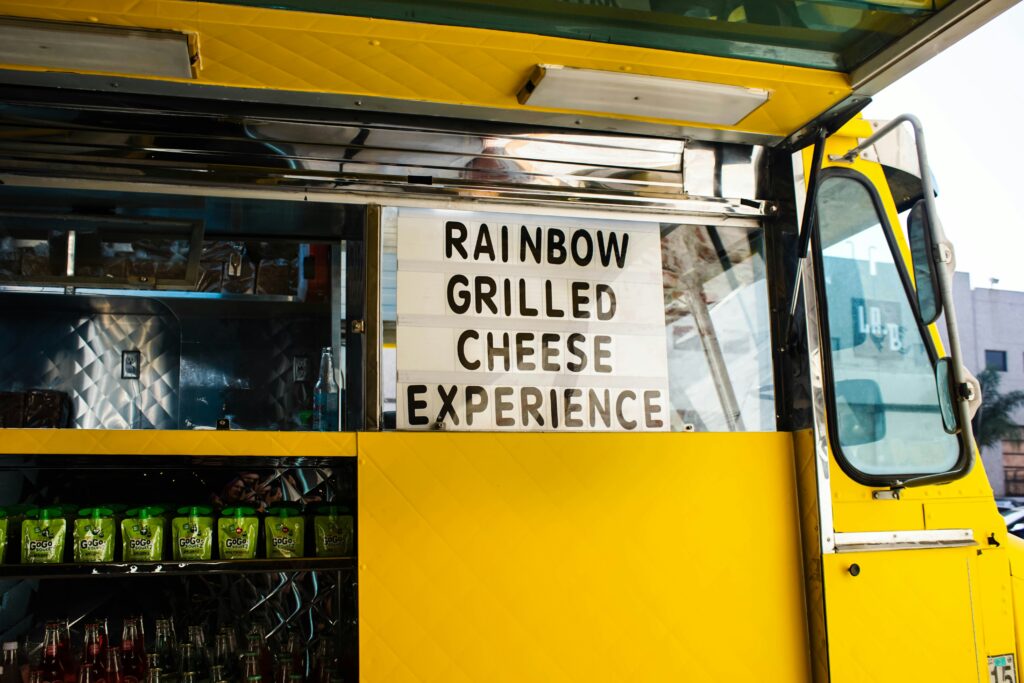Starting a food business can be an exciting and rewarding opportunity, especially for those who are passionate about culinary arts and entrepreneurship. Whether you’re dreaming of running a cozy cafe, launching a food truck, or creating a product line for grocery stores, the food industry offers many opportunities.
In this article, I’ll introduce 15 food business ideas that appeal to various tastes, preferences, and trends. Each idea offers a unique way to enter the market, from creating a niche product to providing memorable dining experiences.
It doesn’t matter whether you’re an experienced chef or just someone who loves food; there’s a niche for everyone.
15 Food Business Ideas
1. Food Truck:

Food trucks offer a dynamic and flexible way to enter the food industry. With lower overhead costs compared to a traditional restaurant, you can experiment with different menus and locations. Whether you specialize in burgers, tacos, or vegan delights, the possibilities are endless.
The key to a successful food truck is creating a unique brand identity and offering a memorable culinary experience. Try engaging with your community by participating in local events and utilizing social media to spread the word. Plus, starting with a food truck can be a great stepping stone to opening your own restaurant.
Tips: Conduct thorough market research to identify locations with high foot traffic. Focus on a few standout menu items to streamline operations.
Challenges: Weather and location constraints can affect sales. Licensing and permits can be complex, so ensure you are well-informed before starting.
2. Home-Based Catering:

For those who love hosting and cooking for others, a home-based catering business can be incredibly profitable. You can start small, catering for local events, corporate meetings, or small weddings.
Emphasize personalized service and customize your menu to meet the specific needs of each client. Over time, you can expand your offerings and invest in larger equipment.
The small size of a home-based catering service allows for creative flexibility and the chance to build strong relationships with your clients.
Tips: Develop a comprehensive menu that showcases your culinary skills. Partner with event planners and businesses for referrals.
Challenges: Managing logistics and coordinating events can be daunting. Ensure you have a reliable team to maintain service quality.
3. Online Cooking Classes:

In the era of the internet, online cooking classes have become increasingly popular. If you have a flair for teaching and a passion for cooking, consider sharing your skills through virtual platforms.
You can offer courses ranging from beginner to advanced levels, covering various cuisines or specific techniques. Create engaging content and build a community of food enthusiasts who are eager to learn from you. Your classes can be live or pre-recorded, offering flexibility for both you and your students.
Tips: Customize classes to different skill levels and culinary interests. Utilize online platforms for broader reach.
Challenges: Differentiating your classes in a crowded market can be tough. Constantly update your curriculum to include trending cuisines and techniques.
4. Meal Prep Service:

With busy lifestyles becoming the norm, meal prep services are in high demand. By preparing and delivering nutritious, ready-to-eat meals, you attract those who want convenience without compromising on health.
You can focus on specific dietary preferences such as gluten-free, keto, or plant-based meals. Ensure that your meals are not only healthy but also delicious and visually appealing.
Tips: Offer subscription models to ensure consistent revenue. Use fresh, local ingredients to enhance flavor and nutrition.
Challenges: Navigating delivery logistics and maintaining meal freshness can be challenging. Plan your delivery routes and storage solutions carefully.
5. Artisanal Bakery:

If you have a passion for baking and a creative touch, opening an artisanal bakery could be the best option. Focus on crafting high-quality, hand-made bread, pastries, and cakes.
Use premium ingredients and traditional baking methods to differentiate your products from competitors. Create a warm, inviting atmosphere in your bakery to enhance customer experience and offer seasonal or custom products that can attract a loyal customer base.
Tip: Host tasting events to attract customers.
Challenges: Consistency in quality and flavor is essential. Managing early morning production can be demanding.
6. Coffee Shop:

Coffee culture is thriving, and your local coffee shop can be a community hub. Beyond serving high-quality coffee, focus on creating an inviting environment where customers can relax and socialize.
Offer a variety of brews, including unique single-origin coffees and expertly crafted espresso-based drinks.
Host events such as open mic nights or coffee-tasting sessions to strengthen community ties and increase your shop’s appeal.
Tip: Offer loyalty programs to retain customers.
Challenges: The coffee shop market is competitive. Location and aesthetics are crucial to attracting a steady stream of patrons.
7. Food Subscription Box:

Food subscription boxes are an easy way to deliver curated food experiences to customers’ doorsteps. You can specialize in snacks, international cuisines, or even DIY meal kits.
Personalization is key; consider allowing customers to choose their preferences or surprise them with themed boxes each month. Focus on quality ingredients, unique products, and exceptional customer service to build a loyal subscriber base.
Tips: Ensure a seamless unboxing experience with attractive packaging. Provide detailed information and recipes to enhance customer experience.
Challenges: Managing inventory and logistics can be complex. Customer retention requires continual quality offerings.
8. Farm-to-Table Restaurant:

A farm-to-table restaurant emphasizes fresh, locally sourced ingredients, appealing to environmentally conscious consumers. Build relationships with local farmers and suppliers to ensure the quality and sustainability of your ingredients.
Highlight seasonal dishes and create a menu that changes with the availability of local produce. Educating your customers about the origins of their food can enhance their dining experience and create a sense of community.
Tip: Highlight the story behind your dishes for a personal touch.
Challenges: Sourcing consistent produce can be challenging. Be prepared for seasonal fluctuations in ingredient availability.
9. Pop-Up Restaurant:

Pop-up restaurants offer a fantastic way to test out a culinary concept without committing to a permanent location. If you specialize in a particular ethnic cuisine, hosting pop-ups allows you to introduce people to authentic flavors and dishes.
Create a buzz through social media and collaborate with local businesses or events to reach a wider audience. The temporary nature of a pop-up adds an element of exclusivity and excitement, encouraging customers to experience your food before it’s gone.
Tips: Collaborate with local venues and chefs for unique experiences. Use limited-time offerings to create urgency and buzz.
Challenges: Securing locations and permits can be complex. Planning and executing within a limited time frame requires precision.
10. Mobile Juice Bar:

As health and wellness trends continue to grow, a mobile juice bar can appeal to those seeking nutritious and refreshing options on the go.
Invest in a reliable vehicle and high-quality juicing equipment, and focus on offering a variety of fresh juices, smoothies, and health shots.
Consider using organic produce and creating a menu that highlights the health benefits of each drink. Location flexibility allows you to attend festivals, markets, and corporate events and reach a broader customer base.
Tips: Use fresh, seasonal ingredients for your juices. Offer custom blends to attract customer preferences.
Challenges: Weather and location changes can affect sales.
11. Cooking Blog and Recipe Development:

For those with a passion for writing and culinary experimentation, starting a cooking blog and developing recipes can be a profitable business.
Share your culinary journey, experiment with new ingredients, and create unique recipes for your audience. Engage with your readers through storytelling, cooking tips, and stunning food photography.
Monetize your blog through sponsored content, advertisements, or even a cookbook. Building a loyal community of readers can open doors to various food-related opportunities.
Tips: Focus on high-quality content and visuals. Collaborate with brands for sponsorship opportunities.
Challenges: Building an audience takes time and consistency. Monetization requires strategic planning and partnership development.
12. Health-Focused Cafe:

A health-focused cafe caters to the growing demand for nutritious and balanced meals. Offer a menu filled with wholesome options, including salads, smoothie bowls, and protein-packed dishes.
Emphasize quality ingredients and provide dietary preferences such as vegan, gluten-free, or paleo.
Create a welcoming space that encourages mindfulness and relaxation, and consider hosting workshops or wellness events to engage your community.
Tips: Create a menu that provides various dietary needs. Use local and organic ingredients when possible.
Challenges: Sourcing quality ingredients can be costly. Staying ahead of health trends requires continuous learning.
13. Vegan Restaurant:

With the rise of plant-based diets, opening a vegan restaurant can be both rewarding and impactful. Focus on creating easy and delicious vegan dishes that appeal to both vegans and non-vegans alike.
Highlight sustainability and the environmental benefits of a plant-based lifestyle. Engage with your community through cooking classes, collaborations, or hosting events that promote a compassionate way of living.
Tips: Experiment with flavors and textures to attract non-vegans. Engage with the vegan community for feedback and support.
Challenges: Competing with established brands can be tough. Sourcing specialty ingredients can be costly.
14. Organic Baby Food Business:

Parents are increasingly seeking healthy and organic options for their little ones. Starting an organic baby food business will allow you to attract customers to this growing market.
Develop a range of nutritious and tasty options made from high-quality, organic ingredients. Consider collaborating with pediatricians or nutritionists to gain credibility and trust among your target audience.
Tips: Highlight the purity and nutritional value of your products. Use sustainable packaging to appeal to eco-friendly consumers.
Challenges: Strict food safety regulations must be followed carefully. Building trust with parents requires transparency and quality assurance.
15. Home-Based Baking:

Imagine turning your passion for baking into a thriving home-based business. From cookies and cupcakes to artisanal bread and pies, there are many options.
Baking businesses are ideal for those who enjoy the comfort of working from home and appreciate the flexibility it offers.
Tips: Start by mastering a few signature recipes. Build a strong online presence through social media and consider local farmer’s markets for exposure. Ensure you comply with local food safety regulations.
Challenges: Balancing production with demand can be tricky. Space limitations and maintaining quality while scaling up are common obstacles.
Conclusion
These food business ideas offer a range of opportunities for entrepreneurs. Whether you choose to start small with a home-based business or open a big restaurant, the key to success lies in passion, creativity, and dedication. Remember, each journey is unique, so embrace the challenges and think about the rewards that come with it.
Related Posts:
- Food Business Names
- Restaurant Names
- Cafe Names For Your Business
- Coffee Business Names
- Bakery Business Names
- How To Make $500 A Week On DoorDash
Frequently Asked Questions
Q: Which food business is most profitable?
The most profitable food business often depends on current trends, market demand, and location, but generally, fast-food restaurants and food trucks are among the most lucrative.
Q: Which food is easy to sell?
When starting a business, easy-to-sell foods often include popular and convenient options like pizza, burgers, sandwiches, tacos, coffee, and baked goods like donuts or cookies.
Q: Which food has the highest profit margin?
In the food industry, the highest profit margins are often found in beverages like coffee and tea, specialty items such as popcorn or chocolates, and snack foods like pretzels or trail mix.
Q: Can I cook meals to sell from home?
Yes, you can cook meals to sell from home, but there are important steps you must follow to comply with local laws and regulations.
Q: What food to sell from home?
Here are some popular food options to consider selling from home:
- Baked Goods
- Specialty Snacks
- Chocolates and Candies
- Jams and Preserves
- Sauces and Condiments
- Meal Prep Services
- Ethnic Foods
- Coffee and Tea Blends
- 100+ Bakery Slogans For Your Business - April 9, 2025
- 18+ Same Day Pay Jobs - April 8, 2025
- 130+ Catering Business Names - April 7, 2025

